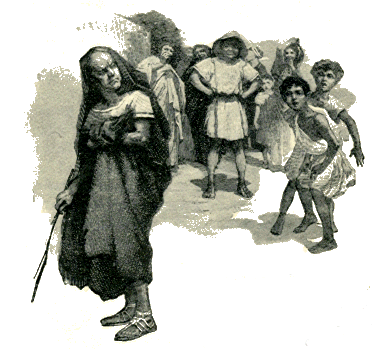Story of the Greeks - Helene Guerber |
Death of Dion
Now, after suffering so much under Dionysius and his father, the Syracusans had learned to hate the very name of tyrant; and ever since Dion had come into the city, and taken the lead, they had loudly said they would never stand such a ruler again.
As soon as the letter was ended, Dionysius tied it to a stone, and threw it over the wall. Of course, it was carried to Dion, who read it aloud, little suspecting its contents, or the effect it would produce upon his followers.
The people began to frown and look angry, and Heraclides boldly seized this opportunity to poison their minds against Dion. He urged them to drive their new leader out of the city, and to give the command of the army to him instead.
The people, ever ready for a change, gladly listened to this advice, and, after banishing Dion, made Heraclides their chief. Dionysius cleverly managed to escape from the citadel; and his general, Nypsius, only then becoming aware of the revolution, took his place there, and by a sudden sally won back the greater part of the city.
As Heraclides was taken by surprise at this move, and greatly feared the wrath of Dionysius, he now wrote to Dion, begging him to come back and save those who had upheld him.
The appeal was not made in vain. Dion generously forgave the treachery of Heraclides, and, marching into the city once more, drove Nypsius back into the citadel, where this general died.
The people of Syracuse were ashamed of having so suddenly turned against Dion after their first warm welcome to him, and they now fell at his feet, begging his pardon, which he freely granted to them all.
In spite of this kindness, which they had not deserved, Heraclides and many others went on plotting secretly against Dion, until his friends, weary of such double dealing put Heraclides to death.
Dion was sorry for this, reproved his friends for committing such a crime, and said that he knew the Syracusans would in time lay the murder at his door, and try to punish him for it.
He was right in thinking thus, for the friends of Heraclides soon began plotting against him; and, entering his country house one day when he was alone, they fell upon him and killed him.
As soon as Dionysius heard that Dion was dead, he hastened back to Syracuse, where he ruled more cruelly than ever, and put so many people to death that the citizens rose up against him once more. With the help of a Corinthian army, they then freed their city, and sent Dionysius to Corinth, where he was forced to earn his living by teaching school.
 The people all hooted. |
As Dionysius was a cross and unkind teacher, the children would neither love nor obey him; and whenever he passed down the street, clad in a rough mantle instead of a jewel-covered robe, the people all hooted, and made great fun of him.